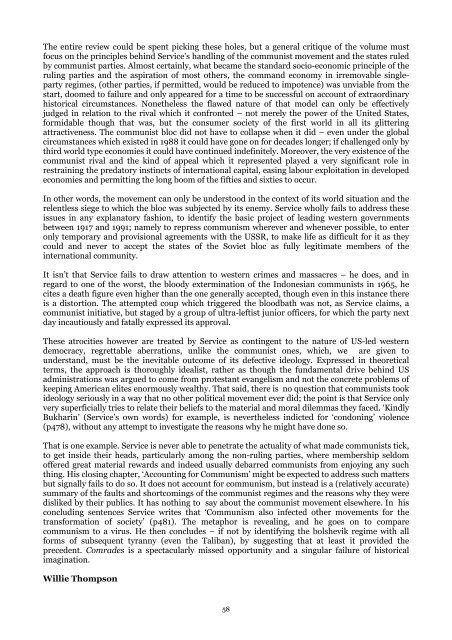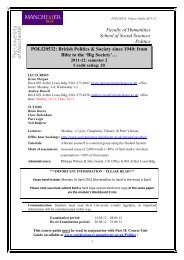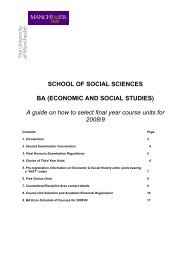CHNN 22, Spring 2008 - School of Social Sciences
CHNN 22, Spring 2008 - School of Social Sciences
CHNN 22, Spring 2008 - School of Social Sciences
Create successful ePaper yourself
Turn your PDF publications into a flip-book with our unique Google optimized e-Paper software.
The entire review could be spent picking these holes, but a general critique <strong>of</strong> the volume must<br />
focus on the principles behind Service’s handling <strong>of</strong> the communist movement and the states ruled<br />
by communist parties. Almost certainly, what became the standard socio-economic principle <strong>of</strong> the<br />
ruling parties and the aspiration <strong>of</strong> most others, the command economy in irremovable singleparty<br />
regimes, (other parties, if permitted, would be reduced to impotence) was unviable from the<br />
start, doomed to failure and only appeared for a time to be successful on account <strong>of</strong> extraordinary<br />
historical circumstances. Nonetheless the flawed nature <strong>of</strong> that model can only be effectively<br />
judged in relation to the rival which it confronted – not merely the power <strong>of</strong> the United States,<br />
formidable though that was, but the consumer society <strong>of</strong> the first world in all its glittering<br />
attractiveness. The communist bloc did not have to collapse when it did – even under the global<br />
circumstances which existed in 1988 it could have gone on for decades longer; if challenged only by<br />
third world type economies it could have continued indefinitely. Moreover, the very existence <strong>of</strong> the<br />
communist rival and the kind <strong>of</strong> appeal which it represented played a very significant role in<br />
restraining the predatory instincts <strong>of</strong> international capital, easing labour exploitation in developed<br />
economies and permitting the long boom <strong>of</strong> the fifties and sixties to occur.<br />
In other words, the movement can only be understood in the context <strong>of</strong> its world situation and the<br />
relentless siege to which the bloc was subjected by its enemy. Service wholly fails to address these<br />
issues in any explanatory fashion, to identify the basic project <strong>of</strong> leading western governments<br />
between 1917 and 1991; namely to repress communism wherever and whenever possible, to enter<br />
only temporary and provisional agreements with the USSR, to make life as difficult for it as they<br />
could and never to accept the states <strong>of</strong> the Soviet bloc as fully legitimate members <strong>of</strong> the<br />
international community.<br />
It isn’t that Service fails to draw attention to western crimes and massacres – he does, and in<br />
regard to one <strong>of</strong> the worst, the bloody extermination <strong>of</strong> the Indonesian communists in 1965, he<br />
cites a death figure even higher than the one generally accepted, though even in this instance there<br />
is a distortion. The attempted coup which triggered the bloodbath was not, as Service claims, a<br />
communist initiative, but staged by a group <strong>of</strong> ultra-leftist junior <strong>of</strong>ficers, for which the party next<br />
day incautiously and fatally expressed its approval.<br />
These atrocities however are treated by Service as contingent to the nature <strong>of</strong> US-led western<br />
democracy, regrettable aberrations, unlike the communist ones, which, we are given to<br />
understand, must be the inevitable outcome <strong>of</strong> its defective ideology. Expressed in theoretical<br />
terms, the approach is thoroughly idealist, rather as though the fundamental drive behind US<br />
administrations was argued to come from protestant evangelism and not the concrete problems <strong>of</strong><br />
keeping American elites enormously wealthy. That said, there is no question that communists took<br />
ideology seriously in a way that no other political movement ever did; the point is that Service only<br />
very superficially tries to relate their beliefs to the material and moral dilemmas they faced. ‘Kindly<br />
Bukharin’ (Service’s own words) for example, is nevertheless indicted for ‘condoning’ violence<br />
(p478), without any attempt to investigate the reasons why he might have done so.<br />
That is one example. Service is never able to penetrate the actuality <strong>of</strong> what made communists tick,<br />
to get inside their heads, particularly among the non-ruling parties, where membership seldom<br />
<strong>of</strong>fered great material rewards and indeed usually debarred communists from enjoying any such<br />
thing. His closing chapter, ‘Accounting for Communism’ might be expected to address such matters<br />
but signally fails to do so. It does not account for communism, but instead is a (relatively accurate)<br />
summary <strong>of</strong> the faults and shortcomings <strong>of</strong> the communist regimes and the reasons why they were<br />
disliked by their publics. It has nothing to say about the communist movement elsewhere. In his<br />
concluding sentences Service writes that ‘Communism also infected other movements for the<br />
transformation <strong>of</strong> society’ (p481). The metaphor is revealing, and he goes on to compare<br />
communism to a virus. He then concludes – if not by identifying the bolshevik regime with all<br />
forms <strong>of</strong> subsequent tyranny (even the Taliban), by suggesting that at least it provided the<br />
precedent. Comrades is a spectacularly missed opportunity and a singular failure <strong>of</strong> historical<br />
imagination.<br />
Willie Thompson<br />
58
















